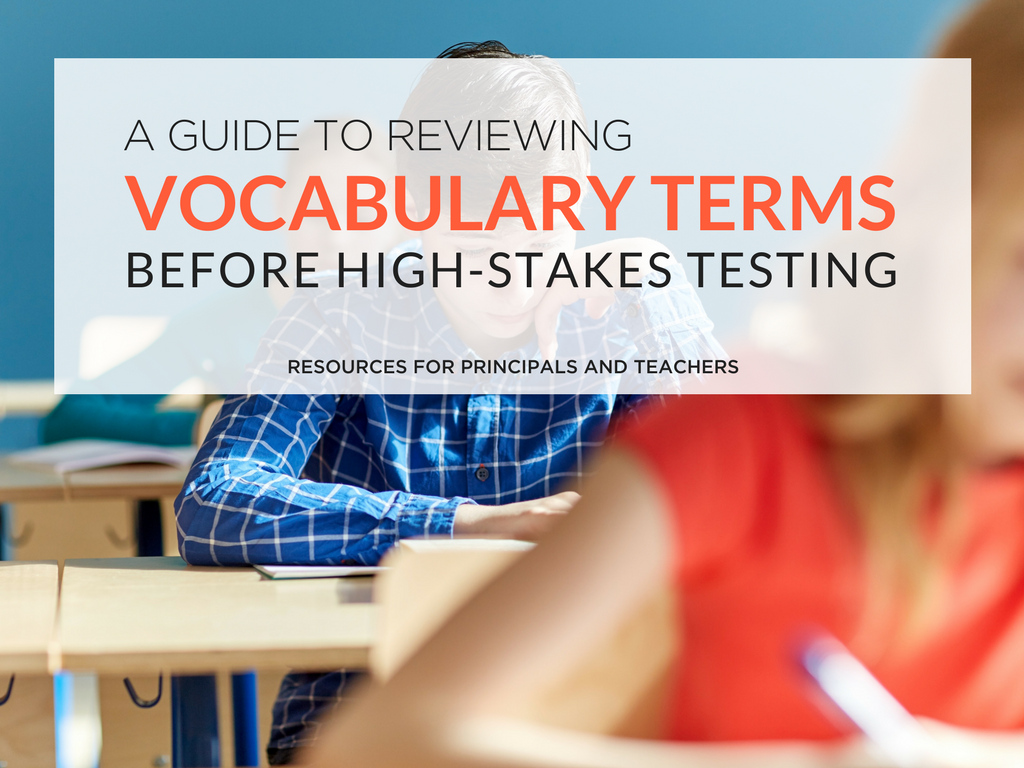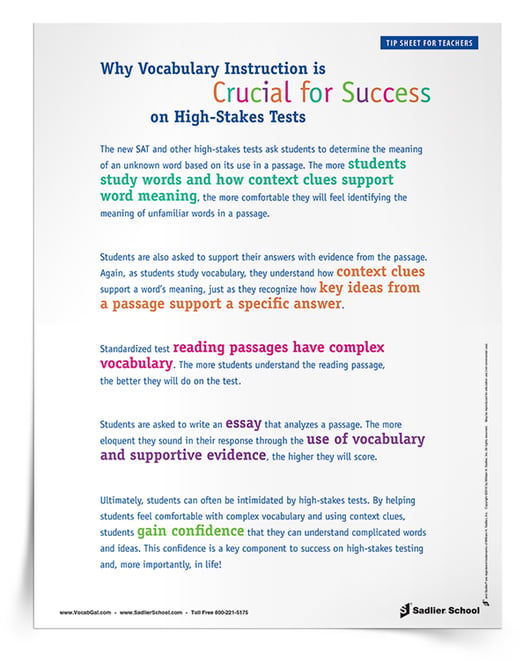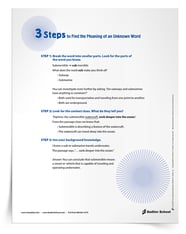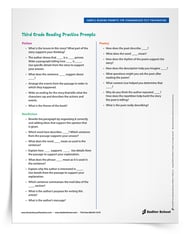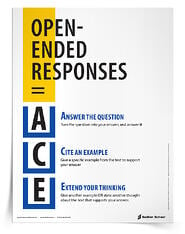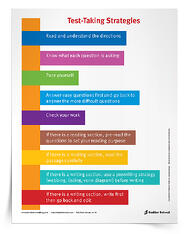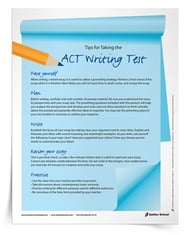April 5, 2018 VG Teaching Strategies Test-taking, Vocab Gal, ELA K-5, ELA 6-8, ELA Resources - Assessment, ELA PD - Assessment, ELA Resources - Tip Sheets, ELA 9-12, ELA PD - Leadership, ELA PD - Vocabulary, ELA Resources - Games, ELA Resources - Charts/Posters, ELA Focus - Vocabulary
A Guide to Reviewing Vocabulary Terms Before High-Stakes Testing
By: Vocab Gal
In this article, you'll explore the benefits and rationale for teaching and reviewing vocabulary strategies as part of high-stakes test preparation! Specialists, instructional coaches, and school principals will gain insights and printable resources to support teachers in their test preparation efforts.
I will always remember the day, early in my career, when my students rushed back into my room after taking the PSAT test shouting, “Ms. Ressler, Ms. Ressler—all our vocabulary was on the test!” I suddenly felt like all of my hard work that year had paid off and that the students really had learned the words we were studying.
This scene has played out every year in some form as my students rush to share where they have seen or used words on high-stakes assessments, and it never fails to fill me with pride to see how vocabulary instruction makes a significant difference in the lives of my students.
WHY VOCABULARY MAKES A DIFFERENCE ON HIGH-STAKES EXAMS
As state exams approach, teachers under your stewardship may be stressed by the requirement to squeeze test preparation into an already packed curriculum. To alleviate some of the pressure, it is important to remind teachers what they need to review with students and to provide them with valuable resources.
I created a handout listing the reasons for teaching vocabulary, first from a teacher’s point of view (see below), and then from a student’s point of view, so that everyone sees the value in studying vocabulary as part of high-stakes test preparation.
-
The new SAT and other high-stakes tests ask students to determine the meaning of an unknown word based on its use in a passage. The more students study words and understand how context clues support word meaning, the more comfortable they will feel identifying the meaning of unfamiliar words in a passage.
-
On the SAT students are also asked to support their answers with evidence from the passage. Again, as students study vocabulary, they come to understand how context clues support a word’s meaning, just as they recognize how key ideas from a passage support a specific answer.
-
Standardized test reading passages have complex vocabulary. The more students understand the reading passage, the better they will do on the test.
-
Students taking the SAT are asked to write an essay that analyzes a passage. The more eloquent they sound in their response through the use of vocabulary and supportive evidence, the higher they will score.
-
Ultimately, students are often intimidated by high-stakes tests. When you help students feel comfortable with complex vocabulary and with using context clues, they gain confidence that they can understand complicated words and ideas. This confidence is a key component to success on high-stakes testing and, more importantly, in life!
Once you explain to teachers that the rationale for teaching vocabulary is to support student success in test preparation, you need to give them ways to do so.
STRATEGIES FOR INCLUDING VOCABULARY IN TEST PREP
STRATEGY 1: VOCABULARY INVENTORY AND ASSESSMENTFirst, have teachers use the Vocabulary Inventory and Assessment so that they and their students have a sense of which academic and vocabulary words students already know and which ones they don’t know.
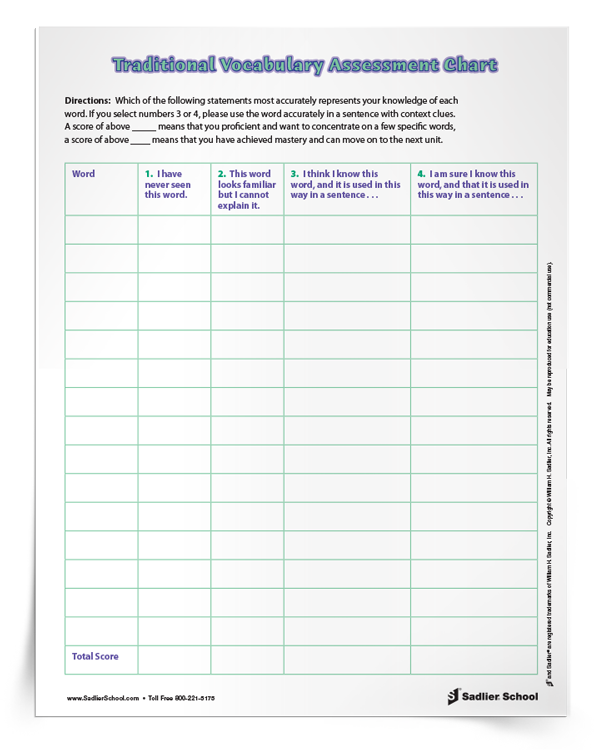
STRATEGY 2: INCREASE WORD USAGE IN THE CLASSROOM
Another great way to prepare students for high-stakes situations is to require them to use vocabulary in all activities and assessments. The more students “play” with words on a daily basis, the more comfortable they will be recognizing and using them on high-stakes reading and writing tests. By increasing their vocabularies and developing word knowledge, students will increase their reading comprehension in all their classes and in testing situations.
Teachers may find my Vocabulary Ladder, Sheet of the Week, and Vocabulary Bookmarks helpful in encouraging students to increase the words they use on a daily basis.
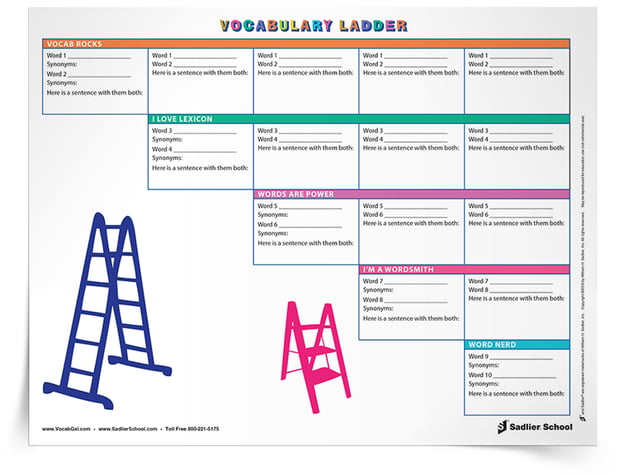
STRATEGY 3: REVIEW HIGH-STAKES TEST TERMS
Next, encourage teachers to use and review high-stakes testing terms in their normal lesson plans and assessments.
Teachers should also incorporate these terms into classroom activities and should clarify how best to answer each question stem while the stakes are low.
For example, a teacher could ask an introductory question such as
-
“Infer from the reading on page 3 how Jimmy felt about his friends.”
-
“Compare the reading we did for homework with the passage on the board.”
-
“Analyze how Martha came to make the decision she did.”
Each day, ask students to complete a bell-ringer question that incorporates various high-stakes testing vocabulary, so that they can practice and refine their answers until everyone is clear on how best to answer a question based on the assessment wording.
Additionally, encourage teachers to use in classroom instructions and conversations the vocabulary words their students have already studied. If students become comfortable with hearing vocabulary words being used as part of everyday routines, they will learn those words fully and feel less daunted when they encounter complex or challenging words in high-stakes situations.
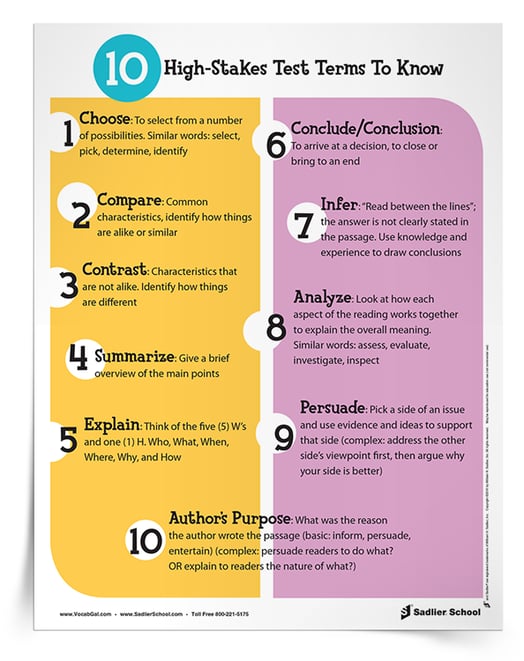
STRATEGY 4: REVIEW CONTEXT CLUES
Next, ask teachers to use every opportunity they can for context clue review. Regardless of whether the lesson is about math, reading, science or social studies, there are always context clues to be found that can help students understand more difficult words and concepts.
For example, a Social Studies reading about famous figures will always include details about each person. Have teachers ask students to use context clues to determine how courageous or selfless a specific person was, and ask them to justify their answers.
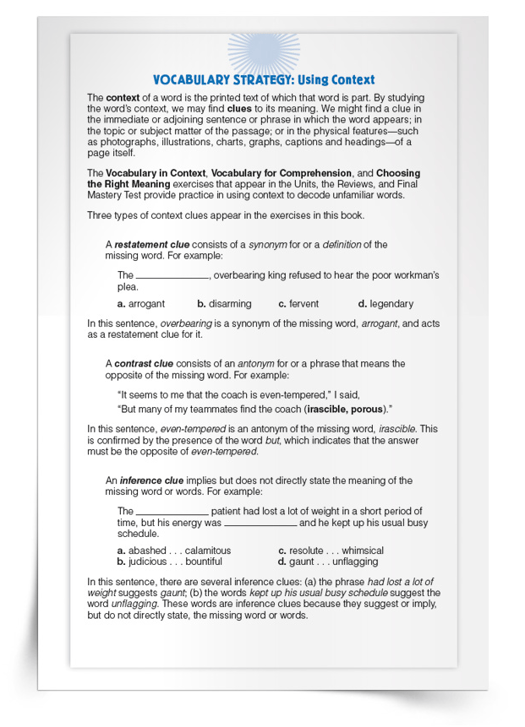
In addition, be sure to encourage teachers to review word affixes and roots when natural opportunities arise to break down word parts.
Often, when my students and I study new vocabulary words or come across unknown words in passages, I separate out any prefixes, suffixes, and roots and I ask my students to speculate on a word’s meaning based on what they know about the word parts. Whenever affixes and roots are learned, I add those stems to the classroom word wall so that my students can apply their knowledge to the next unknown word they encounter.
I love to model this strategy with my students so that they are able to incorporate the strategy for themselves on tests.
Download my free resource to determine the meaning of an unknown word by taking apart the word and thinking about the parts.
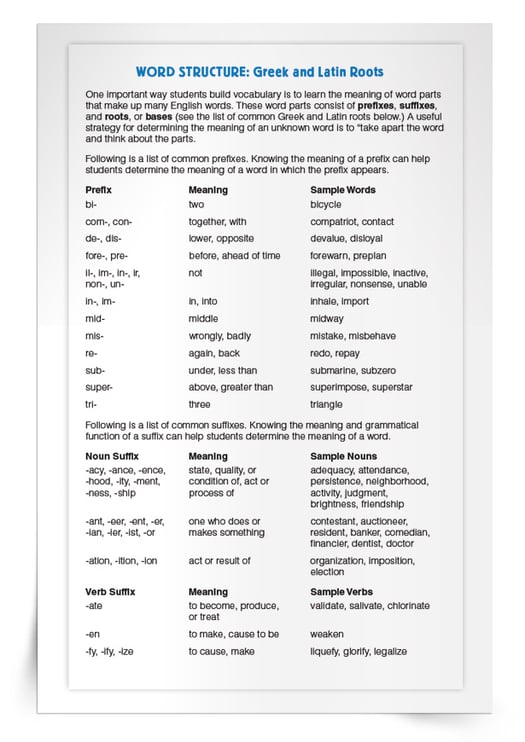
STRATEGY 5: REVIEW TESTING STRATEGIES
A week or so before the high-stakes test, I recommend that teachers use very specific test preparation strategies and practice handouts in class.
For younger grades, use the handout above to gives students three simple strategies to attack any question.
-
Substitute each answer in the blank
-
Justify answers by underlining information from the passage
-
Cross out answers that don’t make sense
Although you may think these strategies are quite basic, often your teachers and their students have not learned these key elements of test preparation.
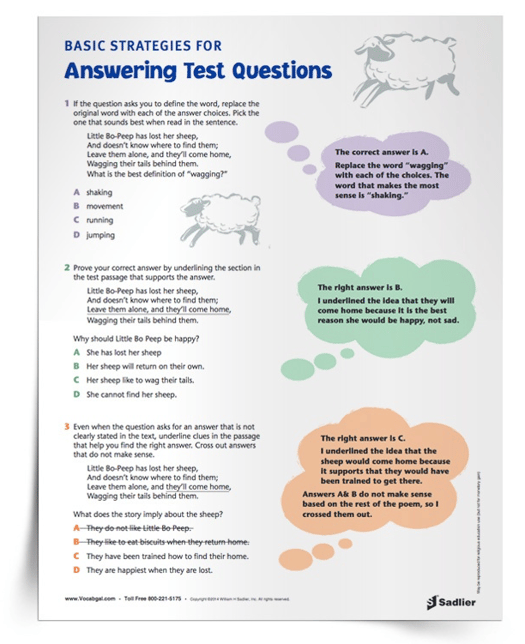
For older students, I have a list of suggestions for answer the various types of high-stakes test questions from multiple-choice to essay prompts.
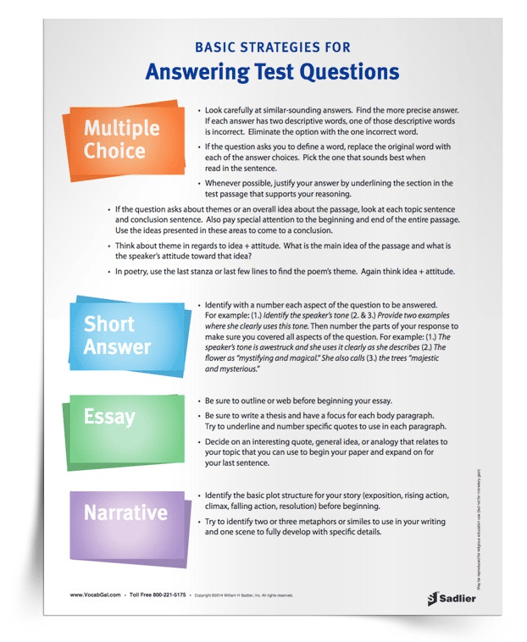
I also have this amazing new handout that details key strategies and provides examples from sample SAT and ACT style passages.
I strongly encourage you to pair these handouts with the Sadlier SAT/ACT Test preparation workbook pages, so that students can apply immediately what they have learned to a practice test.
STRATEGY 6: PLAY VOCABULARY REVIEW GAMES & ACTIVITIES
I have some unusual advice for the day before any high-stakes test that I hope you will impart to your teachers.
The day before any standardized test, I have a variety of vocabulary games and activities, including Oranges to Oranges, Guess that Word, Vocabulary Land, and others, available for students to play.
I find that if students can enjoy vocabulary and take pleasure in reviewing the high-stakes testing words as well as their difficult vocabulary lists, they will feel more confident and happy when they walk into the challenging test the next day.
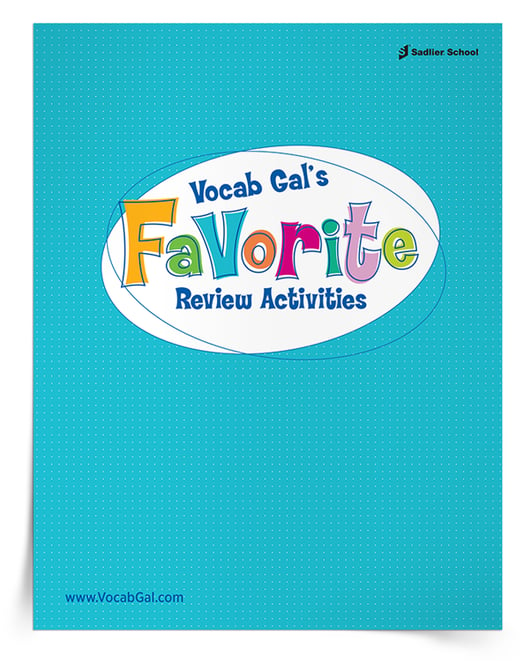
STRATEGY 7: DISCUSS HIGH-STAKES TEST PREPARATION WITH YOUR TEACHERS
Finally, remember to stress these key aspects of high-stakes test preparation to your teachers:
-
Recognize and share with students why learning vocabulary will aide in high-stakes test success.
-
Assess students first to see their strengths and weaknesses regarding word knowledge.
-
Use the language of the tests in daily bell-ringers.
-
Incorporate challenging words into everyday classroom speech.
-
Review context clue strategies throughout all lessons.
-
Examine word roots and affixes whenever possible.
-
Require students to use challenging vocabulary in all activities and assessments.
-
Use test preparation handouts to spell out key test-taking strategies.
-
Have fun and play games with words!
IN SUMMARY
Teaching vocabulary is a key component of student test preparation. Principals and coaches should remind teachers under their stewardship what they need to review with students prior to standardized exams.
With these strategies and tips, you and your teachers will feel confident in your students’ ability to conquer standardized testing!
MORE TEST PREP RESOURCES:




